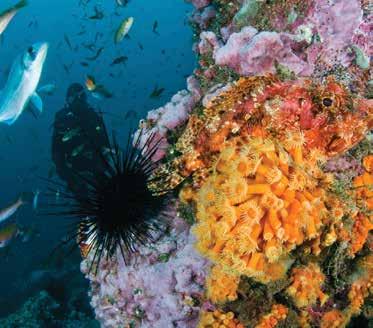
18 minute read
Victories
OCEANA
works on a limited number of campaigns with clear short-term objectives designed to bring our oceans back to abundance and vitality. In 2012, we won numerous important victories for the ocean.

© Bao Tril Photography
PROMOTING RESPONSIBLE FISHING
Irresponsible industrial fishing is pushing wild seafood populations toward collapse, threatening ocean wildlife and one of the world’s essential sources of protein for humankind along with it. A 2012 study from researchers at the University of California, Santa Barbara and the University of Washington showed that more than half of the world’s fisheries are in decline, and the worst hit include smallscale fisheries that are critical for feeding hungry people all around the world.
The good news is that we know how to bring fish stocks back from the brink. Governments need to implement responsible fisheries management — science-based quotas, habitat protection and bycatch reduction — and fisheries will rebound. In fact, the aforementioned study also found that if better fisheries management were established worldwide, the global catch could increase by 40 percent.
Oceana promotes responsible fishing (and the restoration and protection of wild fish stocks and ocean ecosystems) by campaigning for responsible fisheries management. We seek to enact and enforce responsible fishing policies that establish science-based quotas, control bycatch and protect habitat. VICTORY: OVERHAULING CHILE’S FISHERIES LAW Oceana was instrumental in the passage of sweeping new legislation for managing Chile’s fisheries. The new “General Fisheries and Aquaculture Act” establishes new regulations on habitat, fishing quotas and bycatch, the three pillars of good fisheries management, in the nation whose fishery is the seventh largest in the world.
The new law requires that the fishing industry’s catch limits be based on science, not politics. According to a report presented to Chilean lawmakers by Oceana, in the past decade catch limits for three of Chile’s major fisheries — anchovy, jack mackerel and hake — far exceeded scientific recommendations (by 78 percent, 87 percent and 193 percent, respectively). Now, those recommendations will be mandatory, as will a new requirement that fishing fleets reduce the amount of unwanted species, or bycatch, they catch and discard.
VICTORY: EUROPEAN UNION MOVES TO REFORM FISHERIES MANAGEMENT After more than a year of negotiations, a key committee of the European Parliament voted to approve new measures that would greatly improve the way the European Union manages
© OCEANA | Eduardo Sorensen
its fisheries, the fifth largest in the world and one of the worst managed and most overfished on the planet.
The new reforms to the Common Fisheries Policy, the law that governs fisheries in the EU, include an obligation to set catch limits above maximum sustainable yield levels by 2015, in order for stocks to recover by 2020, a clear ban on discards and the creation of a network of fish stock recovery areas. Oceana has been a crucial advocate for these changes. The new reforms will be voted on by entire European Parliament in 2013.
VICTORY: “FREEZING THE MENU” FOR FORAGE FISH After campaigning by Oceana, the Pacific Fishery Management Council decided to “freeze the menu” and to prohibit the development of new fisheries for forage fish off the U.S. West Coast of the United States.
Forage fish are the ocean’s small fish and invertebrates, such as lanternfish, smelts, saury, and small squids. They serve as prey for larger animals, including dolphins, whales, seabirds, and fish species like salmon, tuna, and rockfish. Forage fish have immense ecological and economic value. Oceana’s
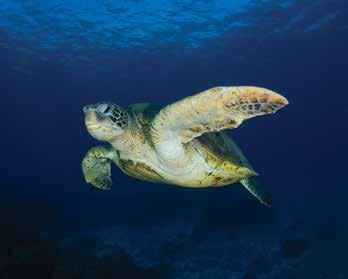

© OCEANA | Carlos Minguell
past efforts to protect these animals had already led to the prohibition of a fishery for krill, a small crustacean that forms a critical part of the food web for animals like the blue whale.
The Council’s decision sets up a process and timetable for interim protective measures and a regulatory process to implement a long-term prohibition on new fisheries.
VICTORY: CALIFORNIA ADOPTS ECOSYSTEMBASED POLICY FOR FORAGE SPECIES
As the direct result of over six years of Oceana’s campaign work with the California legislature and state fishery managers, the California Fish and Game Commission unanimously adopted an ecosystem-based approach for managing the forage species that make up the foundation of the ocean food web. The policy prevents the expansion of new or existing fisheries on forage species in California waters until adequate scientific data on the species in question is available, and requires fisheries managers to consider the ecological values of forage species when setting catch levels. The policy also specifies the ecological information to be used in managing forage species, including the importance of forage fish for other species, including their predators. VICTORY: SALMON AND SEA TROUT GAIN PROTECTIONS IN THE BALTIC
Oceana helped win protections for wild salmon and sea trout in the Baltic Sea. In the summer of 2012, studies from the Baltic found that wild sea trout had become critically endangered. Until recently, there were no limits to how much wild sea trout could be caught despite a decadeslong decline and evidence that populations in Finland and Russia were well below historic levels. This news, along with campaigning by Oceana and our allies, led to a decision by regional authorities to ban wild sea trout fisheries in the Gulf of Finland to give the stock a chance to rebuild. Oceana is pushing other Baltic countries to enact sea trout bans similar to Finland’s.
Meanwhile, salmon in the Baltic Sea have been managed without regard to scientific advice. But in June 2012, after campaigning by Oceana, members of the EU Parliament Fisheries Committee adopted a multiannual plan for the Baltic salmon, a significant step forward towards rebuilding stocks of these threatened fish.
VICTORY: REDUCING BYCATCH OF PACIFIC HALIBUT IN THE GULF OF ALASKA
After revealing the capture of huge numbers of incidentally caught (or “bycaught”) halibut by the trawl fleet in the North
© OCEANA | Eduardo Sorensen
Pacific, Oceana and allies called on the North Pacific Fishery Management Council to cut the allowance for incidentally catching halibut. In June the Council voted to reduce the Gulf of Alaska trawl fleet’s halibut bycatch allowance by 15 percent, phased in over three years, starting in 2014. In addition, because of this decision, fishing fleets that target groundfish using hook and line gear will also have their halibut bycatch allowance reduced 15 percent and factory freezer longline vessels will have their allowance cut by 7 percent, phased in over the same period.
VICTORY: SAVING FOOD FOR STELLER SEA LIONS Oceana scored a victory for Steller sea lions when a federal court ruled to uphold protections for the Western population of these endangered mammals. The protections were put in place by the National Marine Fisheries Service to reduce competition between large-scale commercial fisheries and Steller sea lions in Alaska’s Aleutian Islands.
In 2010, Oceana campaigned for new rules that would prohibit bottom trawling in certain areas where sea lions feed. As a result, the State of Alaska and fishing industry groups sued to have the sea lion protections thrown out, but Oceana prevailed, and protections were kept in place. The ruling means that Steller sea lions will have a better chance of surviving in the Aleutian Islands.

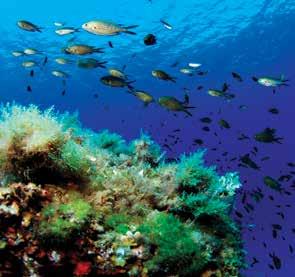
© OCEANA | Carlos Suárez
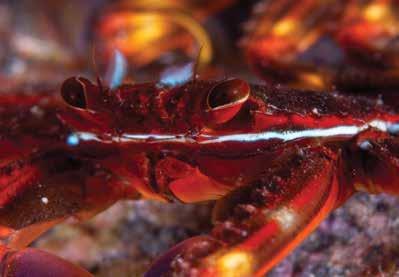
PROTECTING HABITAT AND NURSERIES
Oceans cover 71 percent of the planet, and yet scientists know more about the surface of Mars than the ocean floor. What we do know is that oceans are incredibly productive and abundant thanks to some of the world’s most vibrant ecosystems, from coastal upwellings that nourish a cornucopia of wildlife to centuries-old white coral forests a mile below the surface.
Oceana works to protect these ecosystems before their productivity and biodiversity are destroyed by industrial fishing or pollution. Oceana’s efforts to protect habitat have resulted in the protection of over a million square miles of sea from trawling and other forms of destructive fishing, an area one-and-a-half times the size of Alaska, California and Texas combined. In 2012, Oceana built on its efforts to protect the future viability and biodiversity of marine ecosystems.
VICTORY: PROTECTING ALL OF CHILE’S UNDERSEA MOUNTAINS Oceana was instrumental in the passage of Chile’s new “General Fisheries and Aquaculture Act.” The new law made Chile the first country in the world to protect all of its seamounts from bottom trawling as a precaution while scientists assess these and other vulnerable underwater ecosystems off the Chilean coast. This means that the country’s 118 undersea mountains will now be protected from
© OCEANA | Carlos Suárez
destructive fishing. Seamounts are underwater mountain ranges, where nutrient-rich water fuels an array of life. Expeditions by Oceana and National Geographic to a range of volcanic seamounts northeast of Chile’s Easter Island uncovered flourishing communities of red corals, Galapagos sharks, butterfly fish and more.
VICTORY: NEW MARINE RESERVES APPROVED IN OREGON
After years of campaigning by Oceana and allies, the State of Oregon passed a new law creating the state’s first network of marine reserves and marine protected areas (MPAs). The law designates three new marine reserves and adjacent MPAs, adding an additional 109 square miles to the state’s protected ocean waters. These reserves prohibit all fishing and development while the MPAs allow for limited fishing, but not bottom trawling or offshore development.
Marine reserves give fish and other wildlife a safe place to grow and thrive, which can even benefit unprotected waters as the populations swell and swim past the boundaries of the protected areas. The new reserves and MPAs build on two other sites that were established by the legislature in 2009, and together the five areas combined protect nearly 10 percent of the Oregon coast in a marine reserves network.
© OCEANA | Juan Cuetos
VICTORY: A SAFE HAVEN FOR PACIFIC LEATHERBACKS In a culmination of years of work by Oceana and our allies, the National Marine Fisheries Service designated nearly 42,000 square miles off the U.S. West Coast as critical habitat for endangered Pacific leatherback sea turtles. This is the first permanent safe haven for leatherback habitat in continental U.S. waters, the first recognition of the importance of foraging grounds for sea turtles, and is the largest area set aside to protect sea turtle habitat in the nation.
Since 2006, following the publication of scientific discoveries that the California Current is a primary feeding ground for Pacific leatherbacks, Oceana has campaigned to get these areas protected as “critical habitat” for endangered leatherbacks. The critical habitat designation means that any federally permitted activity will undergo increased scrutiny by the government, and the public, to ensure that activities don’t impact leatherbacks and their habitat.
VICTORY: LEATHERBACK SEA TURTLE BECOMES CALIFORNIA STATE SYMBOL
The California State Legislature and Governor Jerry Brown designated the endangered Pacific leatherback sea turtle as California’s official state marine reptile and declared October 15 as the state’s annual Leatherback Conservation Day.
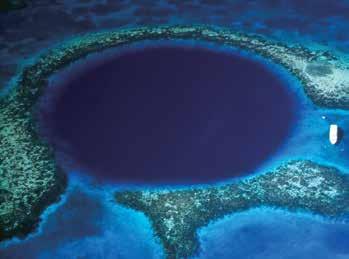
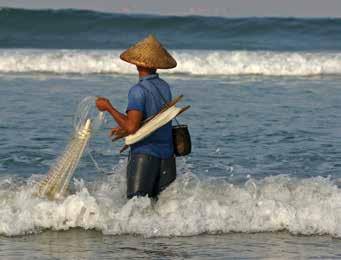
© OCEANA | Carlos Minguell © Tim De Boeck © OCEANA | Tony Rath
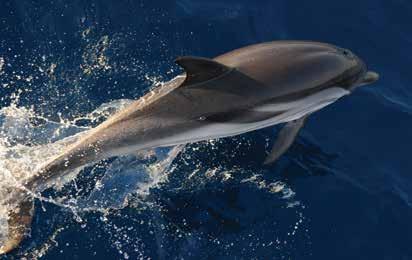
Oceana was a key champion of the bill and won statewide support from thousands of California citizens, the California Fish and Game Commission and more than 30 businesses and other organizations. This literally symbolic victory in the Golden State recognizes the importance of California waters to the survival and recovery of this endangered and ancient sea turtle species, which migrate an astonishing 6,000 miles from Indonesia to coasts of California, Oregon and Washington to feed on jellyfish, and encourages further conservation efforts.
CLEAN OCEAN ENERGY
Oceana continued to fight dirty and dangerous ocean energy, while promoting clean offshore wind energy as a viable alternative. In the United States, legislation expanding oil exploration or drilling continued to be introduced in both chambers of Congress in 2012, but no bill was enacted into law. An economic analysis prepared for the U.S. Department of Energy found that by 2030 the domestic offshore wind industry could create 200,000 jobs, bring in over $70 billion in annual investments and create 4,000 gigawatts of clean power — enough to power the entire United States four times over. In Chile, Ocean fought to limit the footprint of coal-fired power plants that despoil local marine environments and pollute local communities, turning them into “sacrifice zones.” In Spain, Belize and the Arctic, Oceana sought to keep oil drilling out of some the most vulnerable and important ocean ecosystems. Oil companies attempted to install an oil refinery discharging buoy and pipeline in the waters of the Gulf of Cadiz near Doñana. This station would have resulted in many more tankers visiting the area and an increased risk of spills and accidents during unloading operations. Oceana is now pressuring Spain’s government to apply this approach to similar proposed projects that may threaten other marine protected areas.
VICTORY: COAL-FIRED POWER PLANT DEFEATED IN NORTHERN CHILE In 2012, Oceana, together with local communities, successfully campaigned against two coal-fired power plants in Chile. The first, a planned thermoelectric plant known as Castilla in northern Chile, which would have been the largest coal-fired power plant in South America, was rejected by the Chilean Supreme Court.
The Castilla plant was planned for the Punta Cachos area off of Chile’s northern coast, just a few miles from important habitats for Humboldt penguins and sea turtles. As part of its operations, the plant would have released warm water into the ocean, which would have negatively affected the entire ecosystem.
VICTORY: SPANISH NATIONAL PARK SAVED FROM OIL DEVELOPMENT The Spanish government nixed a proposed oil industry development that would have threatened the Doñana National Park, a UNESCO World Heritage Site, after campaigning by Oceana and our allies.
The park is an area of marsh, shallow streams, and sand dunes, and is home to one of the few large stretches of undeveloped coastline remaining in Spain. More than half a million birds winter in the park each year, and the area is home to many rare species, including the Iberian lynx and the Spanish imperial eagle. VICTORY: BELIZE HOLDS “PEOPLE’S REFERENDUM” ON DRILLING In 2011, Oceana collected and submitted petition signatures against offshore drilling from nearly 20,000 Belizean voters, more than enough to trigger the first-ever formal national policy referendum. The government responded by arbitrarily invalidating about 8,000 of the signatures, thereby invalidating the referendum petition.
In 2012, Oceana countered by organizing a national “People’s Referendum” on the question of whether or not Belizeans agreed with ocean oil drilling. Nearly a fifth of the country’s registered voters participated, 96 percent declaring their support for a ban on ocean oil drilling. Oceana filed a formal legal challenge to the government’s invalidation of our original referendum petition, but it was struck down by the court. Oceana is appealing this decision.

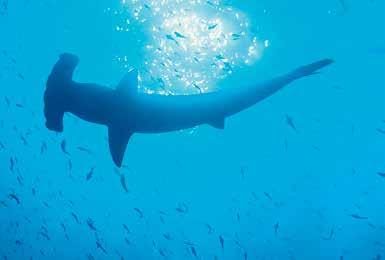
© OCEANA | Juan Cuetos
Oceana also has filed a legal challenge that would effectively declare oil leases that were secretly issued by the government null and void. Our work is beginning to pay off. At the time of the Deepwater Horizon disaster, 86 percent of Belize’s ocean had been leased to oil companies for oil exploration. As of the end of 2012, only 27 percent of Belize’s ocean was leased to the oil companies, due to the fact that many leases have expired and have not been re-issued by the Belizean government, thanks to increasing pressure by Oceana and other organizations in the region.
VICTORY: TAX CREDIT FOR OFFSHORE WIND RENEWED As the U.S. veered ever closer to the so-called “fiscal cliff,” the future of the nation’s offshore wind industry hung in the balance. A financing tool crucial to luring investment to the industry, known as the Investment Tax Credit (ITC), was set to expire on December 31, 2012 unless Congress acted to renew it.
While the credit technically lapsed momentarily, after extensive campaigning by Oceana and its allies, Congress decided to renew the ITC as part of the fiscal deal reached in the New Year. Had the ITC not been renewed, it would have dealt a severe blow to an industry that, though wellestablished elsewhere, is just getting off the ground in the U.S. Meanwhile, subsidies for the oil and gas industry are seemingly permanent provisions of the U.S. tax code. An economic analysis prepared for the Department of Energy found that by 2030, the domestic offshore wind industry could create 200,000 jobs, bring in over $70 billion in annual investments and create 4,000 gigawatts of clean power, enough to power the entire United States four times over.
With the renewal of the ITC, wind companies that had begun to scale back plans for new projects due to financial uncertainty are ramping up their efforts once more, and are ready to attract investors to what could be a booming industry that could reduce the country’s dependence on fossil fuels.
VICTORY: PREVENTING SHELL FROM DRILLING IN THE ARCTIC OCEAN Since 2006, despite its constant efforts to drill in the Arctic Ocean, Shell has not yet been permitted to complete a single exploration well. Shell’s 2012 season, in which the company tried to mobilize its fleet and conduct preliminary drilling activities, was a fiasco. Oceana brought substantial attention to the company’s lack of preparedness and the government’s willingness to stretch legal obligations in order to grant permits and approvals. Together with our partners, we have helped prevent risky exploration activities in Arctic waters through legal action and advocacy.
SHARKS
Sharks have been swimming the world’s oceans for more than 400 million years. While they have survived mass extinction events, sharks are in grave trouble due to heavy fishing pressure, shark finning and bycatch.
As the ocean’s top predators, sharks play a vital role in maintaining the health of marine ecosystems and serve as an indicator of ocean health. Despite their fearsome reputation, sharks are slow-growing, late-maturing, long-lived and give birth to few young, making them extremely vulnerable to overexploitation.
Oceana is working to protect and restore shark populations around the world by campaigning for shark finning bans, species-specific shark management and reduced shark bycatch. We won several major victories for sharks in 2012.
VICTORIES FOR SHARKS IN EUROPE
In a major triumph for sharks and for Oceana, the EU Parliament overwhelmingly voted for a strict ban on shark finning. This new ban will require all sharks caught in EU waters, and by EU vessels fishing worldwide, to be landed
© OCEANA | Juan Cuetos
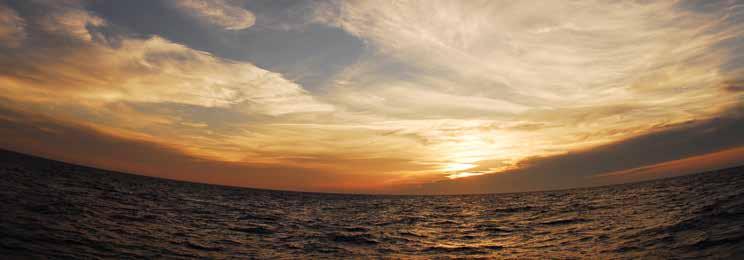
with their fins naturally attached to the body. The decision is the culmination of a two-year campaign by Oceana to close loopholes in EU policy on finning.
In another important win for European sharks, the EU voted in favor of strictly protecting 10 highly threatened species of sharks and rays in the Mediterranean Sea. These species, including hammerheads, tope, and shortfin mako, have declined dramatically in numbers — some by as much as 99 percent during the last century — while others have vanished altogether from parts of the Mediterranean where they were once common. Oceana was the sole NGO pushing for this measure, which prohibits the capture, landing, and sale of these shark species throughout the entire Mediterranean.
VICTORY: ILLINOIS BANS SHARK FIN TRADE
Illinois became the first inland state to ban the trade of shark fins, following the passage of similar bans in California, Oregon, Washington and Hawaii.
Although Illinois is far from the ocean, it imports large numbers of shark fins to be used as the main ingredient in the Asian delicacy, shark fin soup. This demand for fins fuels at-sea shark finning, where a shark’s fins are sliced off and the body is thrown overboard while the shark is often still alive. Tens of millions of sharks are killed each year for their fins, contributing to population declines as large as 99 percent in recent decades. While shark finning is illegal in the United States, there are few federal laws that address the trade of shark fins. In fact, many shark fins are imported into the U.S. from countries with few or even no shark protections in place.
VICTORY: PROTECTING GREAT WHITE SHARKS IN THE PACIFIC
Oceana, along with the Center for Biological Diversity and Shark Stewards, filed petitions with the U.S. federal government and the state of California to list the West Coast population of great white sharks as an endangered species. The classification would bring with it new protections for this unique population of white sharks and provide additional research funding for this iconic top predator.
Recent scientific studies show that great white sharks off the coast of California and Baja California, Mexico are genetically distinct and isolated from all other great white shark populations around the globe and that only a few hundred adult sharks remain. This means there could be fewer than 100 breeding females left in the population. Meanwhile, U.S. and Mexican gillnet fisheries continue to kill young white shark pups in their nursery grounds as bycatch.
In September, Oceana won an initial victory when the National Marine Fisheries Service (NMFS) announced that the petition presented substantial scientific information and that a federal Endangered Species Act (ESA) listing for great whites may be warranted. NMFS is expected to make a final determination on listing the species as threatened or endangered by June 2013.
ALIBABA.COM STOPS SELLING MANTA RAY PRODUCTS
Oceana collected nearly 40,000 signatures from online supporters asking leading international commerce website Alibaba.com to stop selling manta ray leather products. The company quickly responded, pulling down the products and promising to not sell products created from animals protected by the UN in the future, which includes manta and devil rays.
Manta ray populations are overexploited because of demand for their skin and other body parts. Manta ray skin is turned into leather and ultimately into products like cowboy boots and wallets, both of which were available on Alibaba.com. The company had previously made a commitment to sustainability after removing products made from endangered sharks from their website several years earlier.





